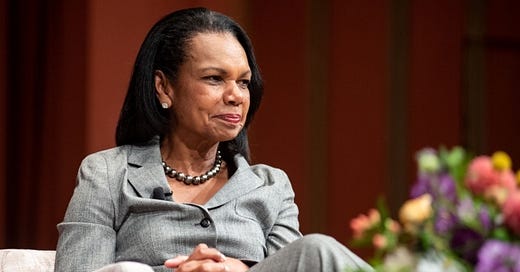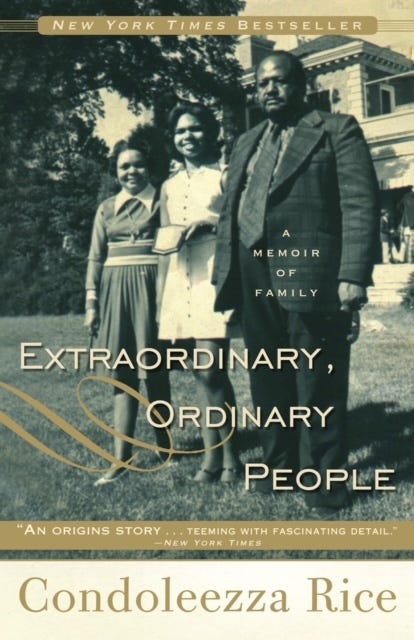Condoleezza Rice's Remarkable Life In Full Color
In our rapidly changing world, strong political leadership is imperative. During times like this, we often seek out books by leaders who help us make sense of the human condition, and the ongoing existential crises we face individually and collectively.
Extraordinary, Ordinary People: A Memoir of Family is one such book as it offers a rare autobiographical glimpse into the life of Condoleezza Rice, one of the preeminent global citizens and leaders of our time.
Filled with an abundance of shifting plot lines and narratives, the book commences with Rice sharing about her upbringing and two remarkable parents while being raised in Birmingham, Alabama. It’s here where she explores how her Black middle-class roots and early life experiences with the racial climate growing up in the Deep South informed her views on freedom and democracy.
Rice’s journey as one of the world’s most recognized global leaders is truly remarkable. Currently serving as the Director of the Hoover Institution, a public policy think tank on the campus of Stanford University, that promotes personal and economic liberty, free enterprise, and limited government. Rice, however, is perhaps most well known as the 66th Secretary of State of the United States, the second woman and first Black woman to hold that post.
From 1993 to 1999, Rice served as Stanford University’s provost where she was the institution's chief budget and academic officer. Prior to that, she served in a number of political appointee positions under President George H.W. Bush’s National Security Council staff.
Rice’s quiet, calm resolve is on display throughout each of the book’s chapters as she explores her journey as a woman wrestling with the paradoxical world of race, politics, economics, and global affairs. Urbane and erudite in her thinking, Rice talks affectionately about her early interest in music (she trained to become a concert pianist) and how it represented an important motif in her life orientation.
While in college, Rice shifted her interests from the musical arts in order to major in political science. Over time she acquired a Ph.D. and became an expert in Soviet and Eastern European Affairs. Her fluency in Russian and Czech is just one element of her impressive repertoire of knowledge which includes history, the arts, and even NFL football.
Toward the latter part of the book, Rice talks about her research work at the RAND Corporation and how this translated into a career at Stanford University. During her first year at this elite university, she received the highest award for teaching. She then went on to become recognized as a prominent Cold War scholar, playing a key role in U.S. policy efforts on the heels of the Soviet Union collapse.
Later in the book, she opens up about her years working for President George H.W. Bush as well as her time with the Presidential administration of George W. Bush.
In reading Rice’s book you can’t help but be impressed by her massive set of achievements, from helping oversee the collapse of communism in Europe, to working to bring back a safe America after 9-11
Bringing Racial Context to Her Upbringing
During this current period in America, one filled with continual calls for racial justice, Rice’s book offers a fascinating set of perspectives about her early life in the South growing up in a middle-class black community. Gov. George Wallace’s calls for “segregation now, segregation tomorrow, segregation forever” were in full bloom at the time as well as the constant threat of racially motivated violence
Her book also explores how in the ’50s and 60s, the role of Birmingham’s black middle-class families was to insulate their children from the ugly realities of racism all while setting them up with foundational systems for ensuring their success in life. In later years as the prevailing environment became harsher, these same kids were instructed to keep their heads down and comply with whatever they were told to do to steer clear of potentially life-threatening consequences.
Rice says she was encouraged by her parents to be “twice as good,” never allowing herself to be cast as a victim amidst segregation’s humiliating circumstances. She describes growing up in a loving household, one where her mother immersed the family in fine arts and her father mentored her on the deeper intricacies of football.
Rice talks candidly about how in the spring of 1963, two bombs went off in her neighborhood along with a series of Klu Klux Klan attacks. A few short months later is when the four girls lost their lives in a heinous church bombing. This period rattled the nation, placing Birmingham in the spotlight of racism in America.
Rice was friends with one of the young girls killed in the 1963 Sixteenth Street church bombing in Birmingham, Alabama
Rice’s book then chronicles their family relocation to Denver in the ’70s, a move that led to Rice’s first flirtation with international politics and foreign affairs at the University of Denver. It was also during this period that her dad decided to transition out of his role as a Presbyterian minister in order to pursue work as an assistant dean at that same university.
Throughout the book, Rice talks affectionately about the unrelenting support she received from him when she elected to follow in his footsteps in the world of higher education. She earned a Ph.D. before becoming a tenured faculty member and later provost at Stanford University.
In the Q&A section of the book, Rice offers her thoughts about the greatest obstacles and challenges facing young Americans in the twenty-first century. She states:
“We are facing a real crisis in this country when I can look at a child’s zip code and tell you whether he or she is going to get a good education. As growth in the world’s economy continues to demand more skilled workers, the United States risks falling behind other nations in maintaining even basic literacy and arithmetic proficiency among our children. Nearly one in four students who take the U.S. military’s entrance exam do not pass, given the poor state of our country’s educational system.”
Citing the crisis in K-12 education as truly the greatest national security challenge facing this country, Rice offered this:
“Compounding this issue is what President George W. Bush called “the soft bigotry of low expectations” that is preventing underprivileged and minority students from reaching their full potential. The widening achievement gap in our country threatens to leave behind an entire generation of students because of an implicit and patronizing bias that suggests their dire circumstances simply make it impossible to help them succeed. We are failing to deliver for these students the basic promise of equality of opportunity that is vital to the American experience. Without that, America will have lost its core principle that makes our country the envy of the world.”
Paying homage to her inspiring family, Extraordinary, Ordinary People is an extraordinary portrait of loving parents who instilled in their daughter the importance of transcending all obstacles, racial or otherwise, through dogged determination and a commitment to education.
Rice’s elegant and thoughtful discourse allows her family legacy to speak for itself. I believe that this book is essential, now more than ever, as our nation confronts a new day in terms of what it means to enjoy a free and purposeful life in America.





